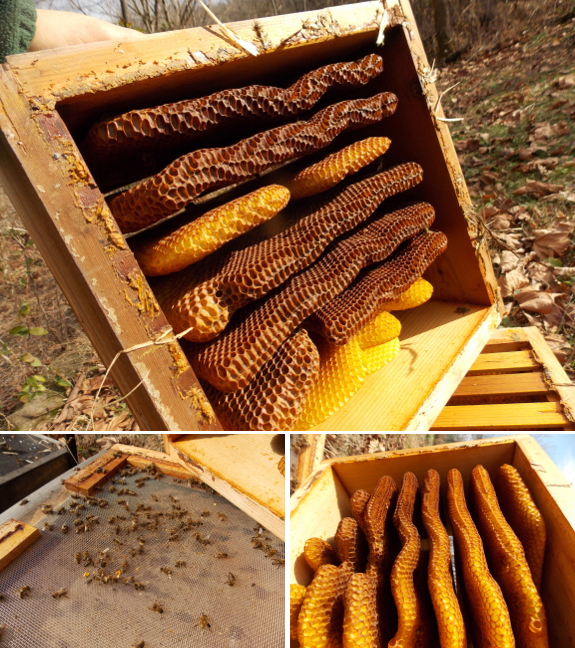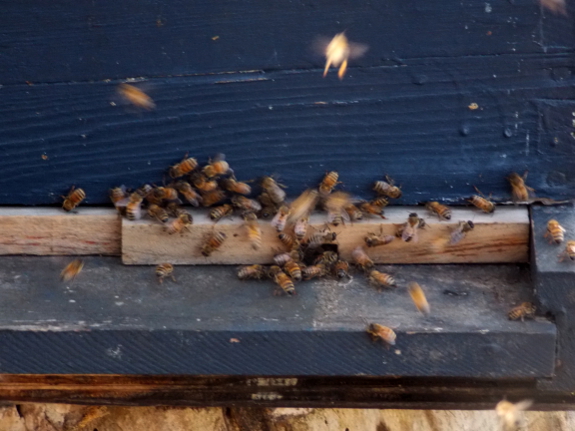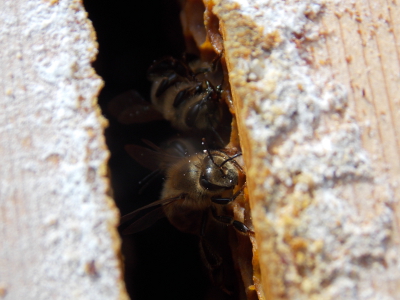
Knocking on wood for bees

To recap, we went into
winter with three hives. Our oldest hive is full of bees shipped
to us from Texas in spring 2012 who swarmed in spring 2013. Our second-oldest hive consists of a package we bought more locally this past spring, who were dusted with sugar to treat varroa mites this fall. And our youngest hive was a very long shot --- a swarm captured near the barn in late June.
If I had to guess in October when I started winterizing,
I would have said the barn swarm had a low chance of making it through
the winter, this year's package had a good chance, and the Texas bees
had a very good chance. Nature has already proven me wrong.

In early December, we
enjoyed one warm, sunny day, and I saw quite a few bees going in and out
of the barn-swarm hive. While I would have liked to believe these
bees were happy residents, I had a sinking suspicion that colony had
perished and a stronger hive was stealing their honey. I figured
if that was the case, there was nothing I could do about it, though, so I
left them alone.
But you know me --- I
like to know where I'm at. So this week I set out to see what I
could tell about our hives without opening them up. I started with
the oldest hive, who I'm most confident about, stuck my ear up against
the box...and heard nothing. Could they really be dead?
Clunk! The camera
around my neck knocked into the side of the hive box, and suddenly the
bees inside began buzzing angrily. Two happy lessons learned at
once --- if you don't hear bees in a winter hive, give the box a little
knock; and, this hive is alive!

The next stop was the
second-oldest hive, which I had a lot of faith in too. Here,
though, my faith didn't seem to be grounded in reality. Even after
knocking on the wood, no buzzing was forthcoming, so I opened up the
hive and found it dead. (Photos at the top of this post and to the
right.)
I'm a bit bamboozled
about what happened to this hive since it had a healthy population
(despite slightly higher than recommended varroa levels) going into the
winter. Now, there are only about 150 bees in the hive, a few
reaching into comb as if they'd run out of food, but most on the
bottom-board and entrance. If the hive wasn't also completely empty of honey, I'd say the culprit was colony collapse disorder.
But maybe the colony collapsed long enough ago that whatever usually
keeps other bees out of these hives dissipated, and the hive was robbed
out?
Without much hope, I
headed up to the barn-swarm hive, knocked on wood, and heard
buzzing! Despite very low numbers going into winter, this plucky
little colony has survived many nights in the teens. Maybe what I
saw two weeks ago was this hive's workers stealing all the honey from
the dead hive so the barn-swarm hive could make it through?
All of this musing aside,
I think I've decided not to go with straight-Warre-style management
next year, and instead to split the strongest hive. I've got two
boxes of Warre comb all drawn out, and that hive seems to have resilient
genetics, so it's probably a good idea to turn one into two.
That won't happen until
midspring, though. For now, I'll just hope the two remaining hives
last through the rest of the winter...knock on wood.
Want more in-depth information? Browse through our books.
Or explore more posts by date or by subject.
About us: Anna Hess and Mark Hamilton spent over a decade living self-sufficiently in the mountains of Virginia before moving north to start over from scratch in the foothills of Ohio. They've experimented with permaculture, no-till gardening, trailersteading, home-based microbusinesses and much more, writing about their adventures in both blogs and books.
Want to be notified when new comments are posted on this page? Click on the RSS button after you add a comment to subscribe to the comment feed, or simply check the box beside "email replies to me" while writing your comment.

Hi Anna and Mark,
I would seem like a different baby monitor transmitter mounted on each bee box would make listening to the bees inside from your warm house pretty easy.
You could get even put it inside the hive.
Pretty cheap to try out! Probably worth a try?